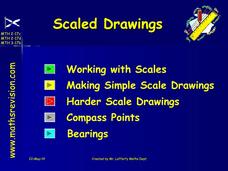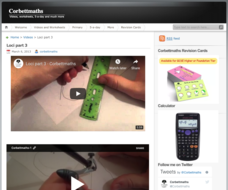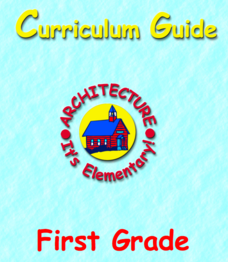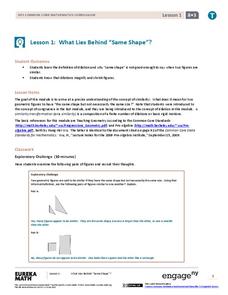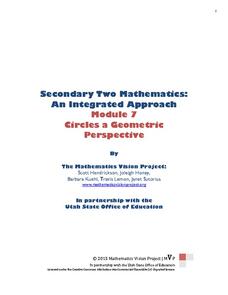EngageNY
Relating Scale Drawings to Ratios and Rates
Enlargements and reductions are all about scale. The instructional activity introduces scale drawing to the class. Pupils determine whether the drawing is a reduction or an enlargement, and the constant of proportionality between the...
EngageNY
Computing Actual Lengths from a Scale Drawing
Class members take scale drawings and examine scales to determine distances in the actual objects. Pupils convert the scales of different units to scale factors that can be used in proportional equations.
EngageNY
The Unit Rate as the Scale Factor
Discover the scale factor by finding the constant of proportionality. Pupils investigate drawings to determine whether the distances are proportional. The activity defines the scale factor as the constant of proportionality, or unit...
Brigham Young University
To-Scale Models
Guided by their analysis of a scene, their initial sketches, and renderings, set designers begin to craft a scaled, 3-D model of the set of the play they have chosen.
Maths Revisions
Scaled Drawings
Your carpenters will enjoy learning scaled drawing techniques and applying their new knowledge to make some real-life scale drawings of gardens. Your carpenter scholars will be reviewing some basic skills in a warm-up section of problems...
EngageNY
An Exercise in Changing Scales
Classmates create a scale drawing from another scale drawing, changing the scale in the process. Groups enlarge or reduce the scale of the drawing and discuss their processes.
Union County Vocational Technical Schools
Engineering Drawing
Knowing the basics of drafting allows individuals to create drawings that show all the views and measurements necessary to allow others to visualize the original object. Pupils gain experience by drawing three orthographic views of...
EngageNY
Computing Actual Areas from a Scale Drawing
Square the scale factor when working with scaled drawings and area. The 19th lesson in a series of 22 introduces calculating actual areas from scale drawings. The lesson encourages pupils to use the square of the scale factor to find the...
Utah Education Network (UEN)
Geometric Figures and Scale Drawings
Scale up your lessons on geometry and ask learners to investigate conditions on triangles, scale drawings, the area and circumference of circles, and angle relationships. The resource includes activities and a homework assignment.
Fun Music Company
Note Drawing
Name that note. Every good boy (and girl) will find it easy to draw notes on these worksheets. The packet includes templates for note drawing, naming, etc.
Corbett Maths
Loci Part 3
How do you use a scale drawing to find the region in a lake where a treasure is located? The narrator of a short video problem identifies three criteria to determine the location of the treasure. Using a compass and ruler, he determines...
EngageNY
An Exercise in Changing Scales 2
Reflect on altering scale factors. The last lesson in the series of 22 has the class compare the two scale drawings they created. They realize that the scale drawing becomes a scale drawing of each other. Class members continue to work...
EngageNY
The Scale Factor as a Percent for a Scale Drawing
Scholars build upon their knowledge of scale drawings by using percents to represent the scale factor. Individuals work with scaling in vertical, horizontal, and both directions.
Fun Music Company
Writing Major Scales
Designed as an assessment of understanding, this one-page worksheet asks musicians to demonstrate their understanding of scales by drawing C, G, and F Major scales on the provided staffs.
Polar Trec
Drawing Diatoms like Ernst Haeckel
Why do scientists rely on drawings rather than just photographs of their research studies? The lesson introduces drawings of microscopic organisms and the importance of accuracy. Young artists draw organisms and learn why focus and...
EngageNY
Drawing the Coordinate Plane and Points on the Plane
To plot a point in the coordinate plane, you first need a coordinate plane. Pupils learn to draw an appropriate set of axes with labels on a coordinate plane. They must also determine a reasonable scale to plot given coordinate pairs on...
American Institute of Architects
Architecture: It's Elementary!—First Grade
Build an interest and appreciation for architecture in your young learners with this fun 10-lesson art unit. Engaging children in using their five senses, the class first observes the environment around them, paying...
Curated OER
Designing a Hiking Trail
Put your students' map skills to the test with this engaging cross-curricular project. Given the task of developing new hiking trails for their local community, young cartographers must map out beginner and intermediate...
EngageNY
What Lies Behind “Same Shape”?
Develop a more precise definition of similar. The lesson begins with an informal definition of similar figures and develops the need to be more precise. The class learns about dilations and uses that knowledge to arrive at a...
Project Articulate
Textured Landscapes with Grant Wood
Explore the world of textured landscapes through the eyes of the famous artist, Grant Wood. Here is an elementary art lesson in which scholars learn about Grant Wood's life, view his work, draw their own textured landscape, and then...
Mathematics Vision Project
Circles: A Geometric Perspective
Circles are the foundation of many geometric concepts and extensions - a point that is thoroughly driven home in this extensive unit. Fundamental properties of circles are investigated (including sector area, angle measure, and...
Civil War Trust
Map the Civil War
Mapmaking was a very important element in successfully planning attacks on enemies during the Civil War. Guide pupils through the process of pacing to find the average length of their steps, measure the distance between one object...
Beyond Benign
The Final Floor
Finally, the final floor plan. The 11th installment of a 15-part series looks at floor plans for houses. Scholars try their hand at creating a scale drawing for the floor plan of their dream houses.
Beyond Benign
Build-A-Math
We can't build our dream house yet, but we can definitely build a model. Scholars use floor plans to build models of their dream homes. Cardboard is as good as any material for this purpose.




